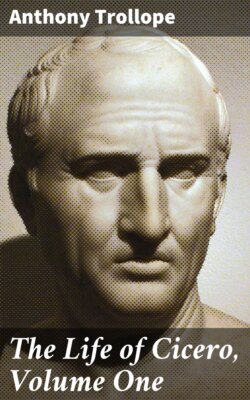The Life of Cicero, Volume One

Реклама. ООО «ЛитРес», ИНН: 7719571260.
Оглавление
Anthony Trollope. The Life of Cicero, Volume One
The Life of Cicero, Volume One
Table of Contents
CHAPTER II
HIS EDUCATION
CHAPTER III
THE CONDITION OF ROME
CHAPTER IV
HIS EARLY PLEADINGS.—SEXTUS ROSCIUS AMERINUS.—HIS INCOME
CHAPTER V
CICERO AS QUÆSTOR
CHAPTER VI
VERRES
CHAPTER VII
CICERO AS ÆDILE AND PRÆTOR
CHAPTER VIII
CICERO AS CONSUL
CHAPTER IX
CATILINE
CHAPTER X
CICERO AFTER HIS CONSULSHIP
CHAPTER XI
THE TRIUMVIRATE
CHAPTER XII
HIS EXILE
APPENDICES TO VOLUME I
APPENDIX A
THE BATTLE OF THE EAGLE AND THE SERPENT
APPENDIX B
FROM THE BRUTUS—CA. XCII., XCIII
APPENDIX C
APPENDIX D
PRO LEGE MANILIA—CA. X., XVI
APPENDIX E
LUCAN, LIBER I
Отрывок из книги
Anthony Trollope
Published by Good Press, 2019
.....
The period of Cicero's life was the very turning-point of civilization and government in the history of the world. At that period of time the world, as we know it, was Rome. Greece had sunk. The Macedonian Empire had been destroyed. The kingdoms of the East—whether conquered, or even when conquering, as was Parthia for awhile—were barbaric, outside the circle of cultivation, and to be brought into it only by the arms and influence of Rome. During Cæsar's career Gaul was conquered; and Britain, with what was known of Germany, supposed to be partly conquered. The subjugation of Africa and Spain was all but completed. Letters, too, had been or were being introduced. Cicero's use of language was so perfect that it seems to us to have been almost necessarily the result of a long established art of Latin literature. But, in truth, he is the earliest of the prose writers of his country with whose works we are familiar. Excepting Varro, who was born but ten years before him, no earlier Latin prose writer has left more than a name to us; and the one work by which Varro is at all known, the De Re Rustica, was written after Cicero's death. Lucretius, whose language we regard as almost archaic, so unlike is it to that of Virgil or Horace, was born eight years after Cicero. In a great degree Cicero formed the Latin language—or produced that manipulation of it which has made it so graceful in prose, and so powerful a vehicle of thought. That which he took from any Latin writer he took from Terence.
And it was then, just then, that there arose in Rome that unpremeditated change in its form of government which resulted in the self-assumed dictatorship of Cæsar, and the usurpation of the Empire by Augustus. The old Rome had had kings. Then the name and the power became odious—the name to all the citizens, no doubt, but the power simply to the nobility, who grudged the supremacy of one man. The kings were abolished, and an oligarchy was established under the name of a Republic, with its annual magistrates—at first its two Consuls, then its Prætors and others, and occasionally a Dictator, as some current event demanded a concentration of temporary power in a single hand for a certain purpose. The Republic was no republic, as we understand the word; nor did it ever become so, though their was always going on a perpetual struggle to transfer the power from the nobles to the people, in which something was always being given or pretended to be given to the outside class. But so little was as yet understood of liberty that, as each plebeian made his way up into high place and became one of the magistrates of the State, he became also one of the oligarchical faction. There was a continued contest, with a certain amount of good faith on each side, on behalf of the so-called Republic—but still a contest for power. This became so continued that a foreign war was at times regarded as a blessing, because it concentrated the energies of the State, which had been split and used by the two sections—by each against the other. It is probably the case that the invasion of the Gauls in earlier days, and, later on, the second Punic war, threatening as they were in their incidents to the power of Rome, provided the Republic with that vitality which kept it so long in existence. Then came Marius, dominant on one side as a tribune of the people, and Sylla, as aristocrat on the other, and the civil wars between them, in which, as one prevailed or the other, Rome was mastered. How Marius died, and Sylla reigned for three bloody, fatal years, is outside the scope of our purpose—except in this, that Cicero saw Sylla's proscriptions, and made his first essay into public life hot with anger at the Dictator's tyranny.
.....